How to Prevent Catalytic Converters From Getting Stolen
Catalytic converter thefts have skyrocketed due to the high demand for platinum and rhodium metals in small quantities inside a catalytic converter.
This 2020 Buick Enclalvbe has four catalytic converters. The lower catalytic converters were stolen, as shown in this picture. The most stolen catalytic converters are from Toyota Prius, SUVs, and trucks. These vehicles’ catalytic converters are the easiest to steal due to their high ground clearance and the fact that they usually don’t have plastic shields under the car.
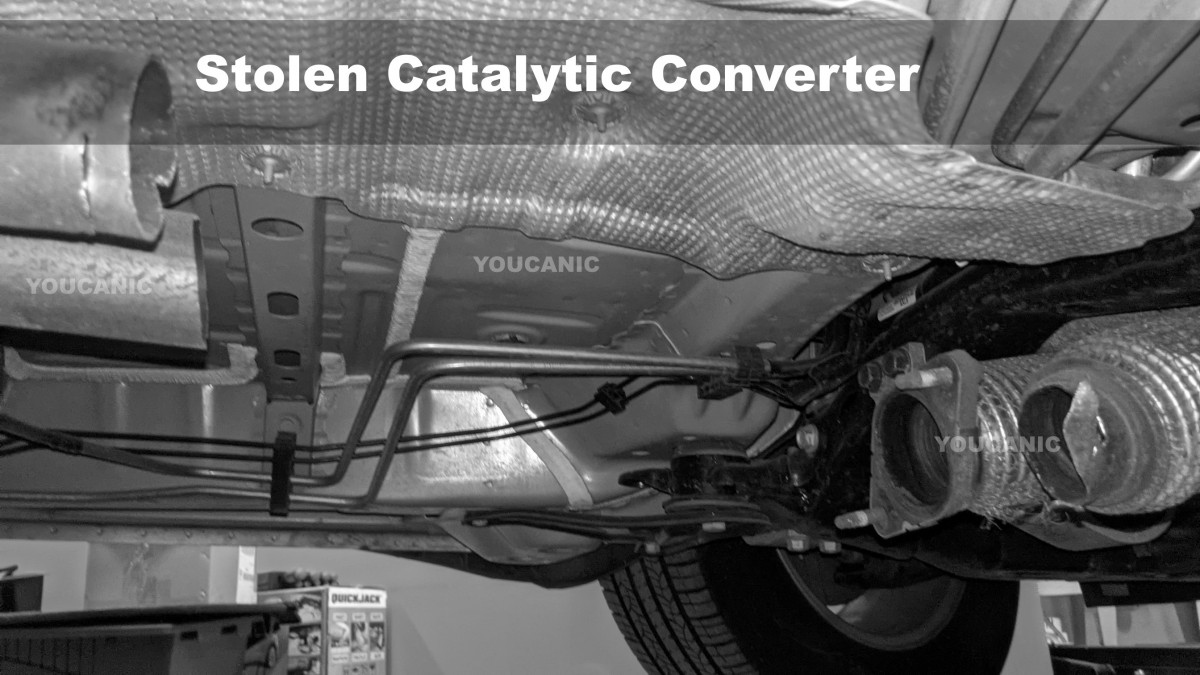
Vehicles that are low to the ground, such as sports cars and luxury vehicles, are more complicated to steal than catalytic converters. It is harder for a thief to get under these vehicles. These cars have sensitive alarm systems and catalytic converters that are very hard to access.
A vehicle with a stolen catalytic converter sounds extremely loud when you start it and even louder when you accelerate, plus the check engine light comes on. A thief can steal a catalytic converter in less than five minutes. A stolen catalytic converter can be sold to scrap metal yards for about $100 to $200.
Why are thieves stealing catalytic converters?
The main reason catalytic converters are stolen is that they’re valuable to scrap metal dealers. The catalytic converter contains precious metals, including rhodium, platinum, and palladium.
All gasoline cars sold in the US since 1974 have catalytic converters.
The only tool a thief needs to steal is a reciprocating saw. Some thieves bring a small jack to raise the vehicle and get under it There have been numerous reports of accidents where thieves were crushed while trying to steal a catalytic convert, and the car jack failed.
How much is a catalytic converter worth?

The function of a catalytic converter on a car is to reduce exhaust emissions. Catalytic converters are worth money, which is why they get stolen. Thieves steal catalytic converters (cats) because a catalytic converter contains precious metals like platinum, palladium, and rhodium, which are worth a lot. Stolen catalytic converters can be sold to scrap metal yards for about $100-$200 a piece, depending on size.
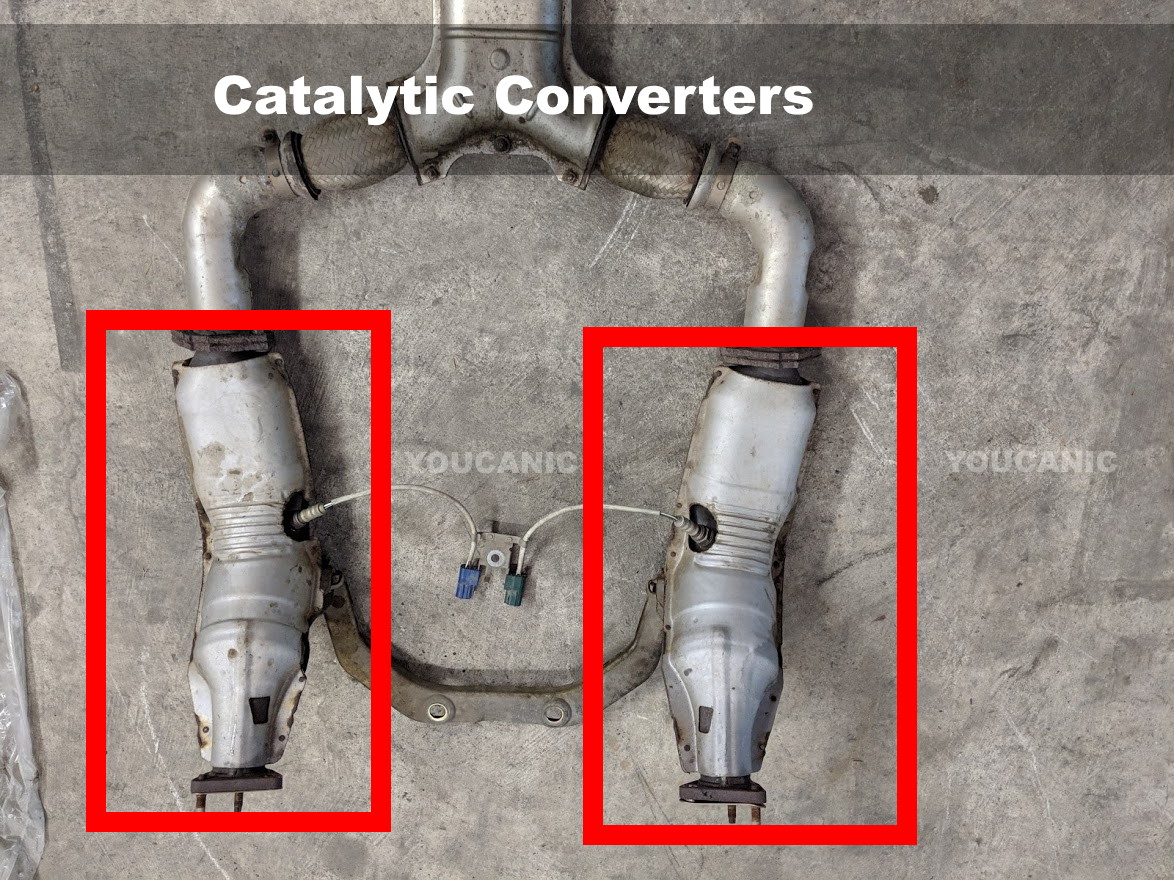
Newer vehicles have anywhere from two to four catalytic converters, which means a thief can easily net $400 by selling two catalytic converters.
How can you protect your catalytic converter from being stolen?
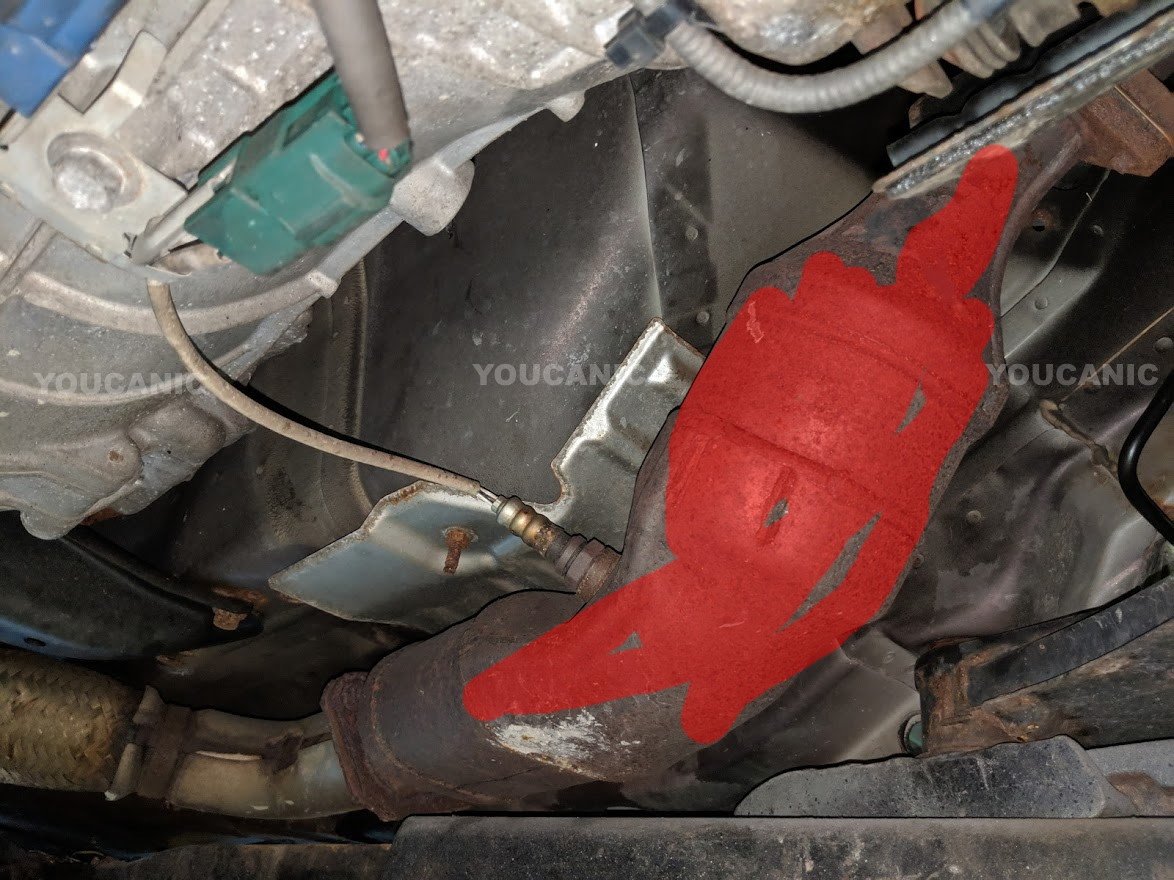
To avoid stealing your catalytic converter, we strongly recommend spraying it orange with high-temperature red spray paint. Reputable scrapyards won’t purchase a catalytic converter that’s been marked; therefore, a thief has no use for a painted catalytic converter.
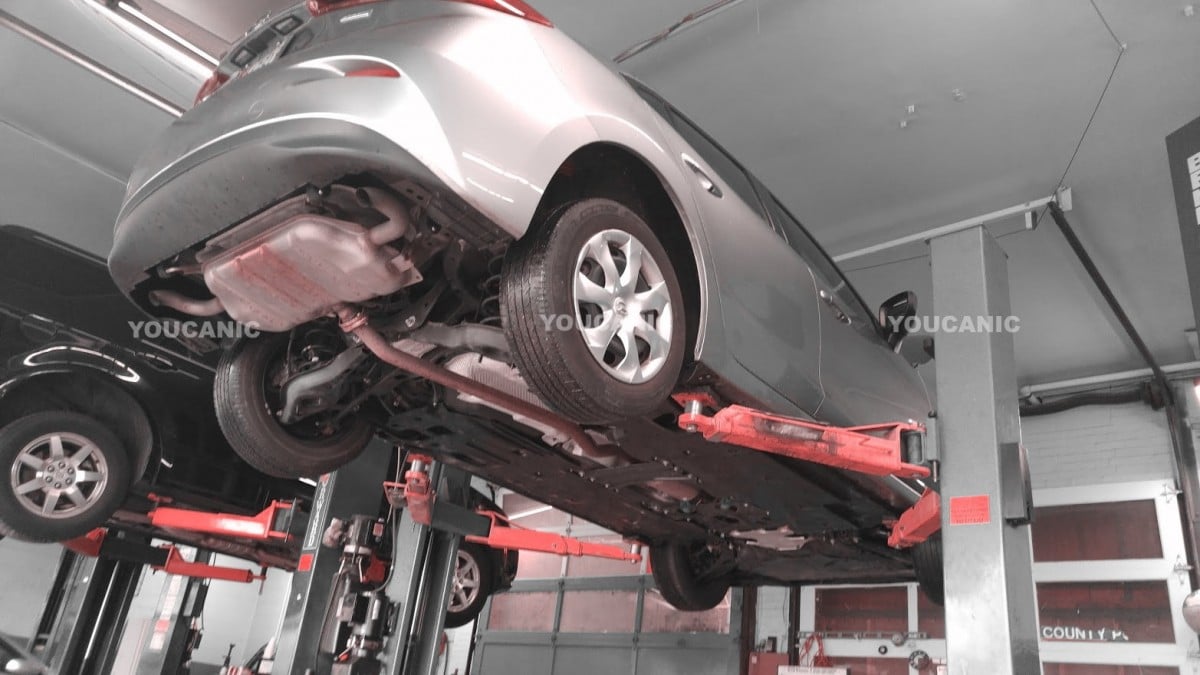
Any auto repair shop can paint your catalytic converter.
This is a simple DIY job that you can do yourself. Park the vehicle on level ground and set the parking brakes. Jack up the car and secure it with jack stands. Once the vehicle is secured, slide under the vehicle and spray the catalytic converters with high-temperature red paint.
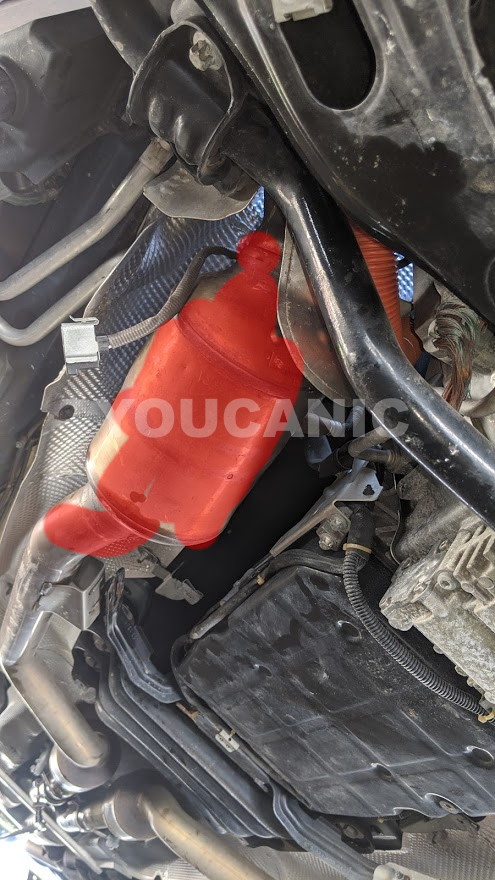
If a thief tries to steal your catalytic converter, they will see that it is painted red and give up because a scrap metal yard will not buy a catalytic converter that is painted red. Another option is to have an auto mechanic install an anti-theft shield to prevent catalytic converter theft.
Steel plates are installed under the vehicle, restricting access to the catalytic converter. You can buy an anti-theft plate for cars like Toyotas and install it yourself.
You can also minimize catalytic converter theft by:
- Parking in a well-lit area and near security cameras.
- Cleaning your garage and parking the car inside instead of parking it outside.
- Install an in-vehicle camera to monitor your vehicle when parked.
Do NOT Weld the Catalytic Converter to the Frame
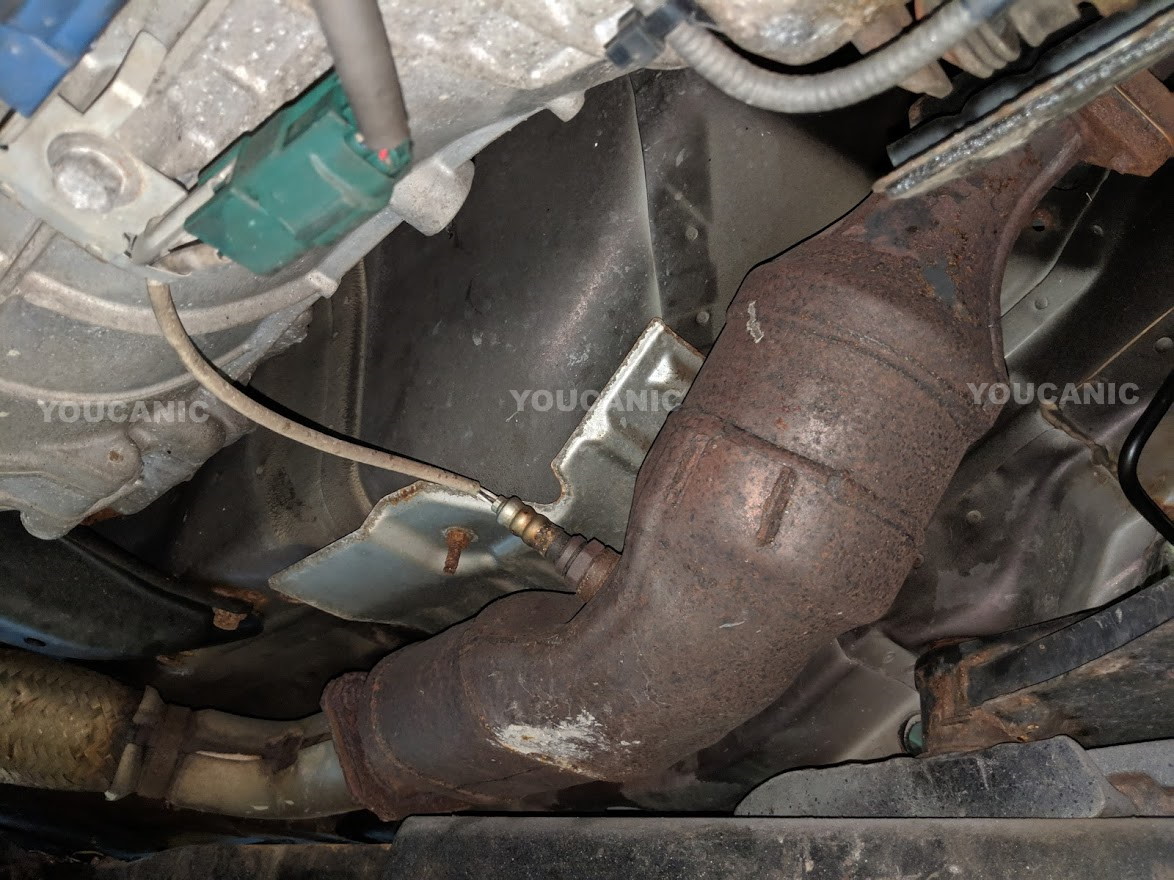
Do not weld the catalytic converter to the frame to deter thieves. Welding, a catalytic converter to the frame, is a bad idea as it causes engine vibrations to be transferred to the cabin.
Welding a steel plate below the catalytic converter to prevent theft is acceptable as long as the plate only covers but does not weld or touch the exhaust. We have also seen vehicle owners install locks to prevent catalytic converter theft.
Installing a lock to prevent catalytic converter theft will make it harder to remove the converter. Still, locks can be easily cut and are less effective than installing a steel plate under the car or painting the converter red.
What to do if you had your catalytic converter stolen

If your catalytic converter was stolen, we first recommend filing a police report.
Next, call your insurance company and ask if they cover catalytic converter theft. If you have comprehensive coverage, your insurance company will cover your catalytic converter, but you still have to pay the deduction of $500 or $1000 for most vehicle owners.
If you only have liability coverage, your insurance company will not cover a stolen catalytic converter, so you will need to pay out of pocket for the repair.
While the cost of replacing a catalytic converter varies depending on the vehicle, make, and model (and how many catalytic convertersneed to be replaced), on average, the cost to replace a catalytic converter at a dealership or auto repair shop is between $850 and $2500, including parts and labor. The catalytic converter can cost up to $2500 on certain high-end luxury vehicles.
A cheaper alternative is to find a muffler shop in your area and have them retrofit an aftermarket catalytic converter. An aftermarket catalytic converter will cost you between $450 and $800, significantly cheaper than having the dealer replace your catalytic converter.
Another option is to replace the catalytic converter with a used one if you have an older vehicle. You can find a catalytic converter used for almost any vehicle on eBay or in a wrenching yard near you. If you purchase a catalytic converter, you do not have to do any welding as it is a simple bolt-on job.
How long does it take to steal a catalytic converter?
While most catalytic converts are stolen at night, thieves can remove a catalytic converter in less than two minutes, so theft can occur in daylight.
This video shows thieves stealing catalytic converters in under one minute. Thieves can cut or unbolt the catalytic converter in less than 10 minutes. Some cars can easily steal a catalytic converter, and thieves can steal a catalytic converter in under two minutes.
Frequently Asked Questions
What is a catalytic converter?
A catalytic converter is an anti-pollution device that neutralizes about 90% of the harmful gases contributing to engine exhaust smog. They are installed on all internal combustion (IC) gasoline, hybrids, diesel cars, trucks, SUVs, and vans.
Where is the catalytic converter located?
Catalytic converter(s) are located behind the engine and are part of the exhaust system. You can see your catalytic convert by raising the vehicle and looking between the muffler and manifold.
Does my car have a catalytic converter?
All gasoline vehicles have one or more catalytic converters. Diesel vehicles have Diesel Particular Filters or PDF. Hybrid cars also have catalytic converters. Electric vehicles do not have catalytic converters.
Where is the catalytic converter located?
Catalytic converter(s) are located behind the engine and are part of the exhaust system. You can see your catalytic convert by raising the vehicle and looking between the muffler and manifold.
Does my car have a catalytic converter?
All gasoline vehicles have one or more catalytic converters. Diesel vehicles have Diesel Particular Filters or PDF. Hybrid cars also have catalytic converters. Electric vehicles do not have catalytic converters.
How many catalytic converters does a car have?
Most four-cylinder gasoline vehicles have only one catalytic converter. Six-, eight-, ten-, or twelve-cylinder engines have at least two catalytic converters, even though four catalytic converters have become more common on newer vehicles.
Will my car insurance pay for a stolen catalytic converter?
It depends on the type of coverage you have.
Your insurance will pay for a stolen catalytic converter if you have comprehensive coverage.
Your insurance will not pay for a catalytic converter replacement if you have liability coverage.
How do you know if your catalytic converter has been stolen?
If your catalytic converter has been stolen, your car will sound very loud when you start it. The noise comes from under the vehicle and can be heard when stopped or driving. You can’t miss it.
Can I straight-pipe a stolen catalytic converter without damaging the engine?
No. Installing a straight pipe instead of catalytic converters is illegal. Remember that the check engine light will come on if you install a straight pipe.
Can a car run without a catalytic converter?
Yes, a car can run without a catalytic converter, but remember that the engine will sound very loud. Even though you can drive a car without a catalytic converter, you must ensure the exhaust pipe will not fall off while driving. Call your mechanic and ask if you can drive the car without a catalytic converter.
Which cars are targeted for catalytic converter theft?
SUVs and trucks, including Toyotas and Nissan cars, are often targeted. Vehicles with very low ground clearance or luxury vehicles are not targeted as frequently due to difficulty accessing the catalytic converter.
We hope you find the How to Prevent Catalytic Converters From Getting Stolen guide helpful. Check these troubleshooting and repair guides for more help on your vehicle.









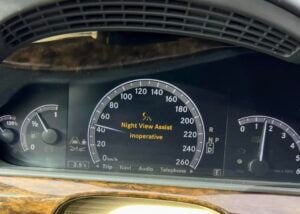

Painting your catalytic converters red is ridiculous. The yard’s buying these cats KNOW they are stolen. They are as dirty as the thieves stealing them.